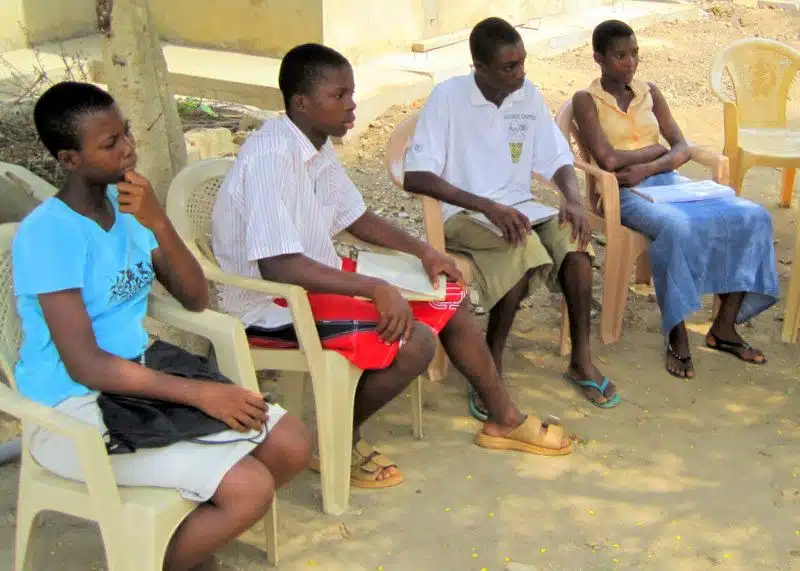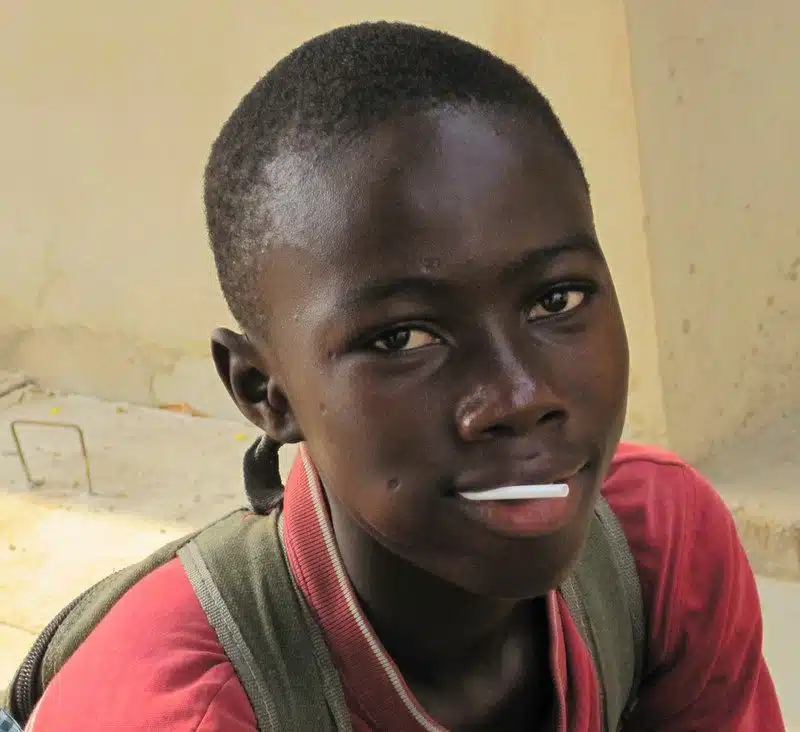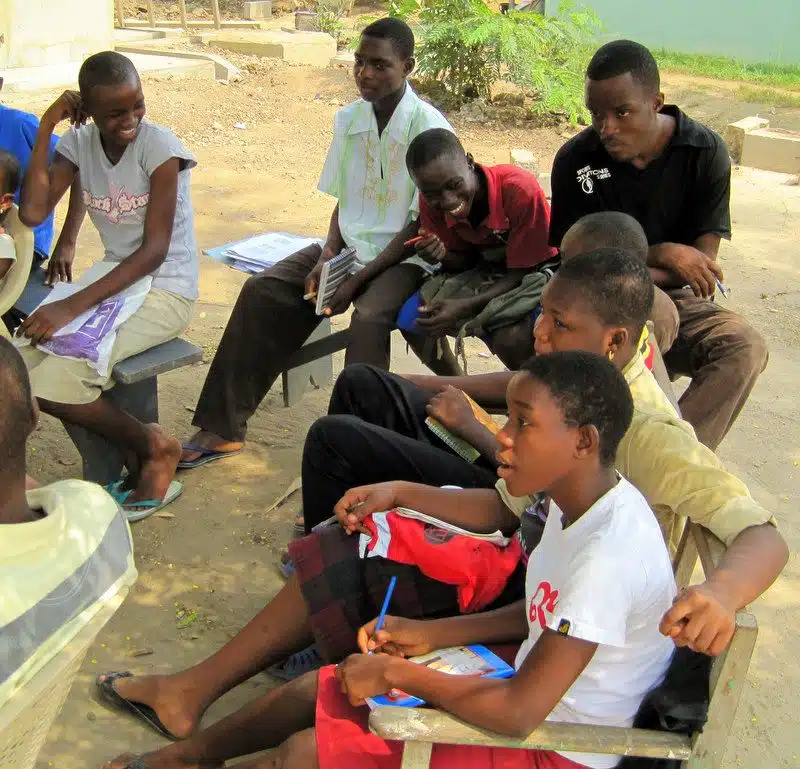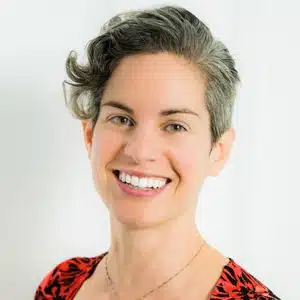Once again today, I was deeply, deeply inspired, as an American educator, by the work of Youth Creating Change, Ghana.
Every Saturday, YCC‘s Director John Glidden gathers under the dappled shade of two trees with the seventeen Ghanaian students who are gearing up to voyage to London in August of 2010 for the return half of an amazing educational exchange.

For the two hours of this “Cross-Culture Class,” John holds his pupils rapt, using a combination of challenging questions (for which he makes students work hard and research for any answers they cannot get), and enthralling interactive lectures on world topics that the children will need to get the most out of their London experience. Since the recent donation of a secondhand laptop, John is able to incorporate cutting edge educational resources.

This Saturday, John launched a unit of study on the United Nations Millennium Development Goals: the year 2000 pact by one hundred and eighty-nine world nations to eradicate extreme poverty in our world by the year 2015.
At first I was mystified. Wasn’t this a topic best left to adults and politicians? Wouldn’t this be far too challenging for these middle school-aged children?

But as the minutes ticked by in that dusty clump of wooden benches, tears of awe began to well up. This topic is exactly right! This topic is vitally important! This topic has been utterly ignored by all the curricula of the schools that I’ve seen since the year 2000! How could this be?
“Today, 1.2 billion people in the world survive on less than a dollar a day,” explained John to the seventeen sun-kissed faces around him, “and 133 million young people cannot read or write. We may think this is the job of the politicians to address, but in fact half the population of our world is made up of young people like yourselves. It is YOU who will inherit the earth, and so it is YOU who must mobilize to hold our governments accountable. We must make sure our friends, families, and acquaintances are aware of these goals so that they may fight for them, too.”

The students nodded and scribbled down notes.
“Ghana is considered a Third World country that still has a long way to go in developing,” explained John, and the students widened their eyes. John continued, “Keep Mother Ghana in mind as we begin working on our projects.”
I raised my hand, scaring a rooster that had sauntered nearby. “Could one of you please explain to me the details of your Cross-Culture Class project?” I asked.
Easteria (what a sincere, eager student!) volunteered. “As we learn about other cultures and ultimately visit England, our goal is to identify the best features of other societies so that we may learn to understand them and bring them back to our communities in Ghana.”
All right! This was a test: I had asked John the same question weeks ago, and was checking now whether the message was getting through to the Cross-Culture students. Indeed, A-plus, Easteria! And what a great goal. May all of our educational projects have the same spirit: find the most wonderful aspect of the new concept you are learning and put it into action in your own immediate surroundings!

For the next several weeks, John will examine each of the eight Millennium Development Goals with the Cross-Culture students. These eight MDG goals are as follows:
1. Eradicate extreme poverty and hunger
2. Achieve universal primary education
3. Promote gender equality and empower women
4. Reduce child mortality
5. Improve maternal health
6. Combat HIV/AIDS, Malaria, and other diseases
7. Ensure environmental sustainability
8. Develop a global partnership for development
World educators, I urge you (amid the tyranny of your mandated state curricula) to incorporate these MDG ideas into your classes! Indeed, we all must do our part if we are to even come close to making progress on these goals by the year 2015! Happily, the website has some excellent ideas on ways that your students can mobilize to create change and put pressure on our governments.
Now a connection: a moment of horror a few years ago in my career as a Boston educator was realizing, during a guest speech from a Teach for America representative, that my twelfth graders in our large, urban school had never heard the term “Achievement Gap.”

The “Achievement Gap,” refers to the divide in academic achievement along racial and socioeconomic lines in America due to pedagogical and historical injustices, and is THE hot topic among educational thinkers… and yet the actual students in question had never been informed that they are at the center of this debate!
I vowed after that moment to continue teaching students about inequalities and development goals within our wider educational system.
I had a similar epiphany upon watching John launch his Millennium Development Goals unit with the young Ghanaian Cross-Culture students. Of COURSE the youth of the developing world should be studying and debating “development” themselves, rather than letting the bigwigs in political palaces blow hot air and effect no change!
Moreover, of COURSE youth of “developed” countries should be spending time learning about these world goals and about the current state of affairs in other countries so that they, too, can advocate for change!
Let us always, always strive to bring the “developing” into our conversations of development, and let us listen well to the words of Lenny Kravitz, quoted in the first few pages of the Youth Millennium Development Goals guide:
“No president, no leader, no king, no emperor.. nobody’s going to change this, except the people!”

The author, Lillie Marshall, is a 6-foot-tall National Board Certified Teacher of English, fitness fan, and mother of two who has been a public school educator since 2003. She launched Around the World “L” Travel and Life Blog in 2009, and over 4.2 million readers have now visited this site. Lillie also runs TeachingTraveling.com and DrawingsOf.com. Subscribe to her monthly newsletter, and follow @WorldLillie on social media!

Imported Blogger Comments
Friday 28th of May 2010
Louisa said... Great post. Can't wait to see how you incorporate all these epiphanies into your future adventures!
I know I sound like a grandma, I can't help it.
January 27, 2010 1:48 AM